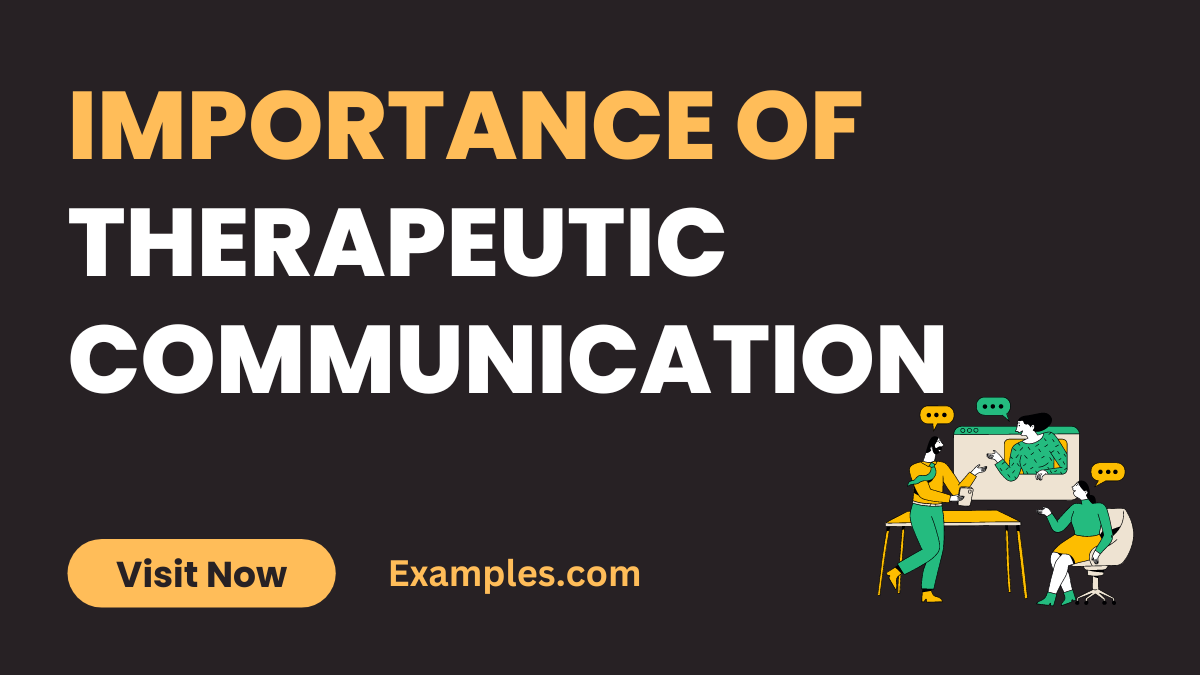19+ Importance of Therapeutic Communication Examples
Step into the world of healthcare communication with our guide on the Importance of Therapeutic Communication. This resource is designed to shed light on how crucial effective dialogue is in patient care. Including practical oral communication examples, this guide will explore how therapeutic communication enhances patient interactions, builds trust, and facilitates healing. Ideal for healthcare professionals, this guide is packed with insights on improving communication skills for better patient outcomes.
What is the Importance of Therapeutic Communication?

Therapeutic communication is an essential aspect of healthcare that involves the use of specific interpersonal techniques to improve patient care and outcomes. It’s the process of interacting with patients in a way that promotes understanding, empathy, and effective information exchange. The importance of therapeutic communication lies in its ability to create a safe, supportive environment where patients feel comfortable sharing their concerns and needs.
Key benefits of therapeutic communication include:
- Building Trust: Establishing a trusting relationship between healthcare providers and patients is fundamental. When patients trust their caregivers, they are more likely to be open and honest about their symptoms and concerns, leading to more accurate diagnoses and effective treatments.
- Enhancing Patient Engagement: Effective communication encourages patients to take an active role in their healthcare. This engagement can lead to better adherence to treatment plans and an increased sense of control over their health.
- Reducing Anxiety and Stress: By addressing concerns and providing clear information, therapeutic communication can alleviate patient anxiety and stress, which are often barriers to recovery and comfort in healthcare settings.
- Improving Health Outcomes: Good communication can directly impact patient outcomes. When patients understand their health conditions and treatment options, they can make informed decisions, leading to better health results.
- Fostering Emotional Support: Therapeutic communication provides emotional support to patients, helping them to cope with the psychological aspects of illness and treatment.
20 Importance’s of Therapeutic Communication
Explore the pivotal Importance of Therapeutic Communication in our detailed guide. Therapeutic communication and the profound benefits they provide, especially in healthcare settings. From building trust between healthcare providers and patients to facilitating patient compliance and emotional healing, each point is elaborated with practical examples. These examples illustrate the effective application of therapeutic communication skills in various healthcare scenarios, demonstrating how these skills lead to improved patient outcomes and enhanced healthcare experiences.
- Building Patient Trust: Through empathetic dialogue, healthcare providers build a foundation of trust.
Example: A nurse patiently listens and responds to a patient’s concerns, creating a comfortable and trusting environment. - Facilitating Accurate Diagnosis: Clear communication aids in obtaining accurate patient information, crucial for diagnosis.
Example: A doctor uses open-ended questions to gather comprehensive patient history. - Enhancing Treatment Compliance: Patients are more likely to follow treatment plans when they understand and trust their healthcare provider.
Example: A pharmacist explains medication benefits and side effects in a clear, empathetic manner. - Improving Patient-Provider Relationships: Strong communication skills foster positive relationships.
Example: Regular, open communication between a patient and their healthcare provider strengthens their therapeutic relationship. - Reducing Patient Anxiety: Effective communication can alleviate fears and anxieties.
Example: A therapist uses a calm and reassuring tone to ease a patient’s anxiety about treatment. - Promoting Patient Education: Educating patients about their health increases their engagement in care.
Example: A nurse uses simple language and visuals to explain a health condition to a patient. - Supporting Emotional and Psychological Well-being: Therapeutic communication helps address the emotional and psychological aspects of patient care.
Example: A counselor provides a safe space for patients to express their feelings and concerns. - Enhancing Team Coordination in Care: Clear communication among healthcare professionals ensures coordinated and effective patient care.
Example: Team meetings where healthcare professionals discuss patient care plans and progress. - Improving Healthcare Outcomes: Good communication leads to better healthcare outcomes.
Example: A multidisciplinary team uses effective communication to develop a comprehensive care plan for a patient. - Crisis Intervention and Management: In emergencies, clear and calm communication is vital.
Example: Emergency medical personnel use direct and clear communication during a crisis situation to effectively manage patient care. - Managing Chronic Conditions: Ongoing communication is key in managing chronic diseases.
Example: Regular check-ins and discussions about disease management strategies between a patient and their doctor. - Fostering Patient Autonomy and Empowerment: Patients feel more empowered when they are actively involved in their care.
Example: A healthcare provider encourages patients to ask questions and participate in decision-making. - Cultivating a Culture of Care and Compassion: Therapeutic communication creates a culture of empathy in healthcare settings.
Example: Healthcare staff consistently show compassion and understanding to all patients. - Dealing with Sensitive Issues: Addressing sensitive health issues with care and empathy.
Example: A healthcare provider approaches topics like terminal illness or end-of-life care with sensitivity. - Improving Mental Health Care: Effective communication is essential in mental health treatment.
Example: Mental health professionals use therapeutic communication to build rapport and trust with their clients. - Navigating Family Dynamics in Patient Care: Involving family members in patient care with clear and compassionate communication.
Example: Family therapy sessions where communication between family members is facilitated. - Enhancing Patient Satisfaction: Satisfied patients are often a result of effective communication.
Example: Patient feedback is used to improve communication strategies in a healthcare setting. - Reducing Medical Errors: Clear communication can prevent misunderstandings that lead to errors.
Example: Double-checking patient information and treatment plans through effective communication. - Supporting End-of-Life Care: Compassionate communication is crucial in end-of-life care.
Example: Healthcare providers discuss end-of-life options with patients and families in a sensitive and empathetic manner. - Promoting Public Health Education: Effective communication is key in public health campaigns.
Example: Public health officials use clear and engaging communication to educate the public about health risks and prevention strategies.
Importance of Therapeutic Communication in Healthcare
The Importance of Therapeutic Communication in Healthcare cannot be overstated. It is a key factor in ensuring effective patient care and support. Therapeutic communication helps in building a rapport with patients, understanding their concerns, and providing emotional support, leading to improved healthcare outcomes. This form of communication is essential for creating a patient-centered approach, which is fundamental in modern healthcare practices. It aids in making patients feel valued and understood, thereby enhancing their overall experience and satisfaction with the healthcare system.

- Supporting Informed Consent: Explaining procedures clearly to ensure patients make informed decisions.
Example: A surgeon discusses the risks and benefits of a surgery in an understandable way. - Handling Patient Complaints: Addressing concerns and complaints with empathy and professionalism.
Example: A patient services manager listens and responds constructively to a patient’s feedback. - Motivating Lifestyle Changes: Encouraging patients to adopt healthier lifestyle choices.
Example: A dietician discusses the benefits of a balanced diet in a motivating manner. - Easing Transitions of Care: Communicating effectively during patient transfers between departments.
Example: Nurses provide detailed handovers to ensure continuity of care. - Enhancing Rehabilitation Communication: Offering encouragement and clear guidance during rehabilitation.
Example: A physical therapist communicates progress and next steps in a patient’s recovery plan. - Improving Family Communication: Involving and informing family members in patient care.
Example: A healthcare provider updates family members about a patient’s condition and care plan. - Navigating Mental Health Discussions: Talking about mental health issues with sensitivity and understanding.
Example: A psychologist discusses treatment options with a patient in a non-judgmental manner. - Promoting Preventative Health Measures: Educating patients about prevention and early detection.
Example: A nurse explains the importance of regular health screenings. - Improving Patient-Provider Dialogue: Fostering open and honest communication between patients and providers.
Example: A doctor encourages patients to express any concerns or questions they have. - Facilitating End-of-Life Discussions: Handling end-of-life care conversations with compassion and sensitivity.
Example: Palliative care staff discuss care preferences and wishes with patients and their families.



